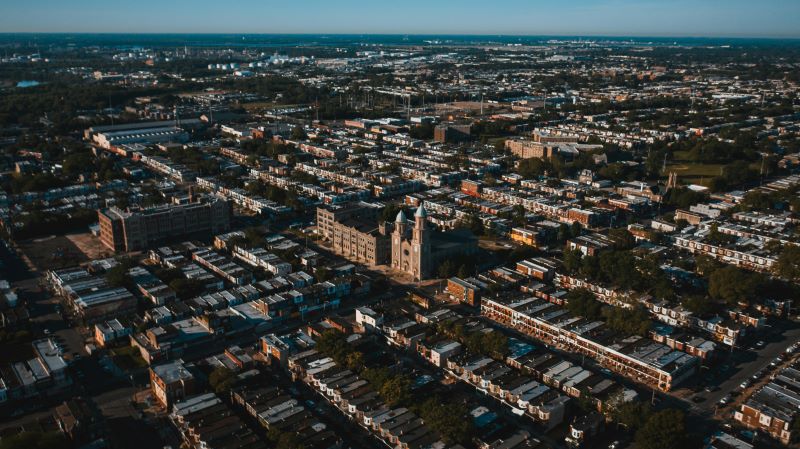Philadelphia residential areas. Photo by Kelly
Story originally published at The Inquirer.
A city ordinance tying a wage tax refund to the state’s Special Tax Forgiveness program is keeping many people who are working poor from claiming the refund.
It is rare today to have a consensus on a major social governmental policy. Yet, most agree that if full-time work does not pay a living wage, then our tax system should not drive the working poor into even deeper poverty.
Progressive tax policies with bipartisan support include the federal Earned Income Tax Credit (EITC), which began in 1975 to incentivize work and supplement poverty-level wages by serving 25 million households. There are state level EITC’s in 31 states and among a few local governments. .
Additionally, thanks to past City Council members and leaders like David Cohen and Allan Domb, Philadelphia’s historically regressive wage tax has been amended to allow for a wage tax refund for very low-income workers.
The law allows the reimbursement of 2.3% of the full 3.75% wage tax for eligible workers. But according to the city’s Revenue Department. as of 2022, only about 1,800 households applied and were found eligible for an average refund of $170. With an estimated 60,000 eligible under its criteria, the take-up rate is less than 3%. As the 2023 Pew Charitable Trusts study, “The Local Tax Burden on Philadelphia Households,” summarized, the refund is “an undersubscribed program that, if used more widely, would lower the [low-income taxpayer] tax burden.”
The mission of Philadelphia’s targeted wage tax relief mirrors the EITC’s highly successful, refundable tax credit by rewarding work, substantially reducing poverty, and creating a more equitable tax system. Research conducted by Keystone Research Center Executive Director Stephen Herzenberg and commissioned by City Council demonstrates that a wage tax credit for the working poor would economically benefit the city by “raising consumer demand in the city more than an equal dollar amount of [across-the-board] tax relief distributed [would].” Low-income beneficiaries would spend the refund through purchases from local businesses and services, similar to the way beneficiaries of the federal EITC spend it.
So why is it that what could be Philadelphia’s most pro-work, anti-poverty tax policy isn’t working?
The largest factor undermining enrollment is that city ordinance ties the wage tax refund to the state’s Special Tax Forgiveness program, requiring the refund claimant to first file for and be approved for Pennsylvania’s special tax forgiveness.
The latter’s eligibility criteria exclude many working poor by barring a single person who earns more than $8,750 annually, and a married couple with a child earning more than $24,750.
The federal EITC income limits are double our state’s, and that impacts city wage tax refund standards.
Other undermining factors cited in the Pew study include administrative barriers such as the amount of documentation required, the relatively complicated calculations, and a general lack of awareness and outreach.
The last obstacle to a fairer, complete exemption from the entire 3.75% wage tax emanates from a historical anachronism: 1.5% of the wage tax (denied as a refund) is set aside and collected under the state Pennsylvania Intergovernmental Cooperation Agency law. At one point in the 1990s, this was a security on PICA bonds issued to bail out the city, but all of these have now been paid off.
In an absurdity worthy of Alice in Wonderland, the 1.5% — about $700 million a year — is collected only to be returned by the state to the city after a day or two. Instead of being allowed to sunset, the state PICA 1.5% wage tax law was recently renewed without any consideration that this is viewed by the city as a bar to a total 3.75% wage tax refund for its low-income workers.
What can be done to reform this situation? The mayor and City Council can work together to amend the City Code to delink the wage tax refund from the state Special Tax Forgiveness program, and to establish more realistic poverty eligibility criteria like those of the federal EITC. The federal EITC income limits are double our state’s and that impacts city wage tax refund standards.
In a Sept. 6 memorandum from Mary McDow, assistant city solicitor of Philadelphia to the Tax Reform Commission, regarding proposed wage tax refund reforms, McDow agrees with us that the wage tax refund law could use the more generous income limits from the state’s PACENET legislation, legislation — income standards adopted this past year by City Council in its Low Income and Senior Citizens Real Estate Tax Freeze program.
The city solicitor also agrees that paperwork and documentation requirements could be streamlined and that the city could automate notices on wage tax refunds and adopt other awareness and outreach measures.
Finally, to enable a complete wage tax refund for its working poor, the city, after meeting its state PICA law obligations for “collecting” the 1.5% wage tax for the state, could use a small part of what is returned to the city treasury to provide for a total wage tax refund.
Local tax equity is a goal for us all to embrace.
(Jonathan Stein is a former director and general counsel at Community Legal Services and a former 2002 Tax Reform Commission member. Nikia Owens is the president and CEO of Campaign for Working Families.)





